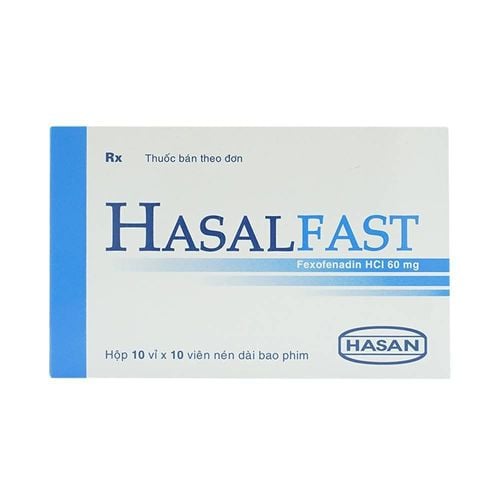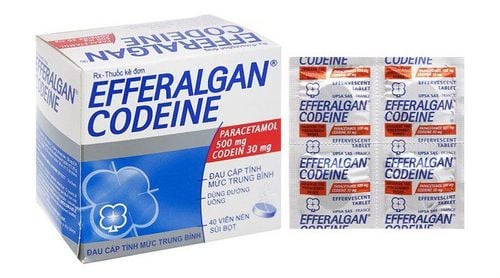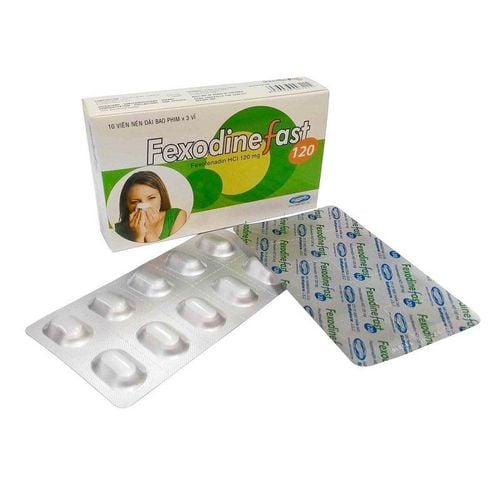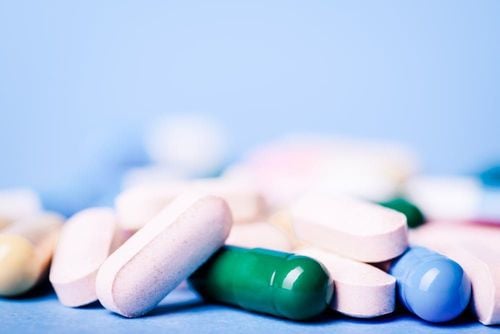This is an automatically translated article.
Ternafast 60 belongs to the group of anti-allergic drugs commonly prescribed to treat the symptoms of allergic rhinitis, urticaria, rashes, ... So what is the effect of Ternafast drug, what is the note when using the drug?1. What is Ternafast?
Ternafast has the main ingredient Fexofenadine hydrochloride - is a second generation antihistamine, selectively antagonistic on peripheral H1 receptors for the treatment of allergic symptoms. Fexofenadine binds slowly to the H1-receptor to form a stable complex that dissociates slowly, resulting in rapid and long-lasting action. The drug does not affect the central nervous system and does not induce sleep. Ternafast does not inhibit the potassium channel involved in myocardial repolarization and is therefore not cardiotoxic. After oral administration, the drug is rapidly absorbed, 60-70% bound to plasma proteins, mainly bound to Albumin and Alpha 1 - Acid Glycoprotein, reaching peak blood concentrations after about 120 - 180 minutes. The drug is metabolized mainly in the liver and eliminated in the feces about 80%.
2. Indications of the drug Ternafast
Ternafast drug is indicated for the treatment of the following medical conditions:
Seasonal allergic rhinitis: Runny nose, watery eyes, itchy nose, singing, red eyes, itchy eyes,... pruritic symptoms of chronic idiopathic urticaria. Relieve symptoms of sneezing, runny nose, itchy throat, stuffy nose, ... caused by allergies to weather, dust, and the environment.
3. Contraindications of the drug Ternafast
Do not use Ternafast in the following cases:
Patients who are allergic to Fexofenadine or any other ingredient of the drug. Patients under 12 years of age are not indicated for use of Ternafast. Note when using Ternafast drug:
At therapeutic doses Ternafast does not cause sleep, however, for people working in environments that require concentration and meticulousness such as driving, operating machinery, manual work. should be careful when using the drug. There is no evidence that the drug crosses the placenta or breast milk, but it should only be used by pregnant and lactating women when absolutely necessary and with the advice of a doctor. Monitor renal function before and during drug therapy in patients with impaired renal function, elderly patients. Ternafast should be used with caution in patients with cardiovascular disease and in patients with pre-existing prolongation of the QT interval on the electrocardiogram. The drug should be discontinued for at least 24 - 48 hours before performing intranasal antigen tests.
4. Ternafast drug interactions
Some possible drug interactions when combining Ternafast with other drugs:
Antacids containing aluminum and magnesium will be less effective when used with Ternafast. Therefore, the medication should be taken at least 2 hours apart. Ternafast's other drug interactions have not been proven, but before combining with any other drug, it is necessary to consult a specialist.
5. Dosage and usage
Usage:
Ternafast is prepared in the form of 60mg film-coated tablets. Swallow the tablet whole with water, do not crush or separate the tablet. Take the medicine 30-60 minutes after eating. Dosage:
Seasonal allergic rhinitis: Take 1 tablet (60mg)/time x 2 times/day. Maximum dose 180mg/day. Chronic idiopathic urticaria: Take 1 tablet (60mg)/day x 2 times/day; Or 3 tablets (60mg)/time/day. Patients with renal impairment: The starting dose is 1 tablet (60mg)/time/day. Patients with hepatic impairment, elderly patients with stable renal function do not need to adjust the dose of Ternafast. If overdose can cause some symptoms such as: Drowsiness, dry mouth, dizziness,... When detecting abnormal symptoms, stop the drug immediately and take the patient to a medical facility. nearest to be treated. If you forget to take a dose, take it again as soon as you remember. If it is almost time for your next dose, skip the missed dose and take the next scheduled dose. Do not double the missed dose of Ternafast.
6. Ternafast drug side effects
Some unwanted effects when using Ternafast:
Common side effects
Headache, dizziness, drowsiness, nausea, vomiting, fatigue,... Indigestion, digestive disorders. Increased likelihood of viral infections (cold, flu), upper respiratory tract infections. Sore throat, fever, cough. Sinusitis, otitis media. Dysmenorrhea. Musculoskeletal pain. Uncommon side effects:
Sleep disturbance, nightmares, startle, fear. Dry mouth. Rare side effects:
Anaphylactic reactions, urticaria, angioedema, dyspnea, chest tightness, flushing of the face. In summary, Ternafast is an anti-allergic drug commonly prescribed in diseases of allergic rhinitis, urticaria, ... The drug is easy to use, has good therapeutic effect, but overdose will cause some side effects. undesirable effects on the central nervous system.













